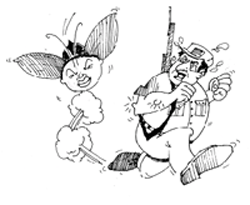SOMALIA
 A widely-available anti-malarial drug has been blamed for some of the military excesses committed by United Nations troops in Somalia. The drug, mefloquine, is recognised by the World Health Organisation as one of the most effective anti-malarial drugs. It is often used as a preventive treatment against the disease. Mefloquine is, however, often associated with severe side-effects, including depression and hallucinations. According to an article in a May 1999 issue of the British medical journal Lancet , several soldiers from a 900-member Canadian contingent which served in the ill-fated peace-keeping mission in Somalia between 1992 and 1993 have blamed the drug for their poor judgement during operations, which on at least one occasion led to the death of innocent Somalis.
A widely-available anti-malarial drug has been blamed for some of the military excesses committed by United Nations troops in Somalia. The drug, mefloquine, is recognised by the World Health Organisation as one of the most effective anti-malarial drugs. It is often used as a preventive treatment against the disease. Mefloquine is, however, often associated with severe side-effects, including depression and hallucinations. According to an article in a May 1999 issue of the British medical journal Lancet , several soldiers from a 900-member Canadian contingent which served in the ill-fated peace-keeping mission in Somalia between 1992 and 1993 have blamed the drug for their poor judgement during operations, which on at least one occasion led to the death of innocent Somalis.
The Lancet article is based on a report by Denis Desautels, the Canadian government auditor-general, which says that the country's military did not follow accepted protocol while administering mefloquine to Canadian soldiers serving in the mission. Mefloquine was then still under clinical trial in several countries. "The drug was obtained on a trial but was given to soldiers without following the required measures to monitor the effects and keep track of its distribution,' Desautels said.
Related Content
- Somalia economic update: integrating climate change with Somalia’s development- the case for water
- Climate-resilient development for Somalia
- Children displaced in a changing climate
- Rapid assessments of the hunger–climate–conflict nexus in Mali, South Sudan and Somalia: first assessment
- East Africa Economic Outlook 2023: mobilizing private sector financing for climate and green growth
- Somalia climate risk review
